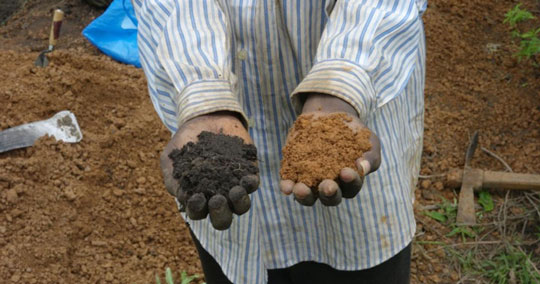Project dates: 2011 to 2013
This project investigated how charred carbon (biochar) is used to enrich soil by African farmers, and how it is being discussed and promoted as a potential solution to environmental problems.

Image credit: Dawit Solomon, Cornell University
Biochar is being promoted as a “triple win” to address climate change, energy and food security. Companies, schemes and public bodies have moved to capture its benefits, raising concerns about land rights and land grabs.
The research explored:
- How African farmers enrich soils with carbon, and how this compares to well-documented methods used in Amazonia before the arrival of European settlers
- How farmers in Africa distinguish, value and use these soils
- How biochar is discussed and promoted by various groups and networks
- Who benefits from biochar, and how it can become part of pathways to sustainability that support smallholder farmers. What governance, policy and institutions would help?
The project was funded by an ESRC research grant.
Dark Earths in West Africa
So far, research concerning “dark earths” has been confined to Amazonia. Based on preliminary observations in West Africa, this research hypothesised that farmers in humid tropical Africa already manipulate soil carbon and associated ecology in similar ways.
The research brought together ecological anthropologists, historians and soil scientists from the UK, West Africa and the USA. The research sites were in the forest region of Ghana, Liberia, Sierra Leone and the Republic of Guinea.
Findings
The findings support strategies to promote sustainable farming, and strategies to enhance the sequestration of carbon in tropical agro-ecosystems.
The project served to highlight how biochar and dark earth technologies can meet small farmers’ perspectives and priorities.
Findings from the project were covered in a National Geographic article in June 2016.
STEPS members working on this project:
- Melissa Leach – STEPS Centre director
Research team
- Professor James Fairhead, University of Sussex
- Professor Kojo Sebastian Amanor, Institute of African Studies, University of Ghana
- Professor Johannes Lehmann, Cornell University
- Dr James Fraser, University of Sussex
Links
- International Biochar Initiative
- The Biochar Fund
- Terra Preta Network
- UK Biochar Research Centre
- Biogenic Sequestration of Carbon Dioxide workshop
- Environmental Sustainability Knowledge Transfer Network
- Biochar, poverty and development – presentation by Melissa Leach